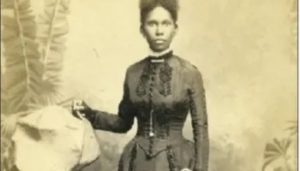
Elizabeth Flood
*This date in 1828 is celebrated as the birth date of Elizabeth Thorn Scott Flood, a 19th-century Black educator and activist.
Elizabeth Thorn was born a free woman in New York State. She received a good education in New Bedford, Massachusetts, and married her first husband, Joseph Scott. In 1852, Elizabeth and her husband moved to California and settled in Placerville. Joseph worked as a gold miner and died shortly after their arrival, leaving Scott Flood alone to care for their son Oliver. Feeling that Placerville was not an adequate place for a Black widow and her young son, she moved to Sacramento, which had a sizable Black population.
Arriving in Sacramento, her attempts to enroll Oliver in the local public school were stopped. They did not accept Black students, not by law, but by tradition. With the help of the local church, in 1854, she opened a small private school for non-white children at her home on Second Street, between M and N Streets. In her school, Scott was the teacher and received a salary of $50 a month from the parents of the school's students. Her school initially had only Black students, but soon began to accept Native and Asian students as well. At that school, students ranged in age from four to twenty-nine years old. A few months later, the Sacramento school board decided to take over the school's administration, but not to provide funding, an arrangement that Scott accepted while continuing her fight for equal rights for her students.
In 1855, Scott Flood attended the first Colored State Convention in Sacramento. At that convention, Black activists strategized on how to lobby California politicians for better representation and fundamental civil rights, including voting rights. During that year, she met her second husband, Isaac Flood. Isaac was a freed slave who had been born in South Carolina and freed at the age of 22. Flood was twelve years older than Scott and also had a son. The couple and their children soon moved to Brooklyn, California, a thriving small community near Oakland.
By 1857, Scott Flood and Isaac opened a school for Black children at their home on East 15th Street. At the time, Black children did not have access to public schools in Oakland. By 1858, the Floods had three children, were involved in the community, and were one of the area's most prominent and progressive families. That same year, they helped start the Shiloh African Methodist Episcopal (Shiloh AME) church, the first African Methodist Episcopal church in the area. In 1863, the church purchased an old 20-30 building and moved it to Second and Market Streets. The building was an abandoned old school for white children. With that building, the Shiloh AME church took over the school and used it for both church services and educational purposes.
Scott Flood continued to teach at the school until she died in 1867. The local school laws did not allow African American students into public schools until 1872; in 1866, it opened up government-funded schools for African Americans and non-white children. The Shiloh AME school operated for ten years before closing its doors in 1873. Elizabeth Scott Flood, a teacher who fought for equal educational rights for all children in California, died in 1867 at the age of 39. She left behind her husband, Isaac, and five children.
Although Scott never witnessed the desegregation of schools, in 1872, the city of Brooklyn began to accept Black students in its schools and was subsequently annexed by Oakland. Scott Flood's youngest daughter, Lydia Flood Jackson, was among the first Black students to attend Oakland schools in 1872. By 1875, all Black schools in the area had closed, and in 1880, the law in the state of California was changed, outlawing school segregation.
To Become an Elementary School Teacher
To Become a Middle School Teacher
To become a High School Teacher